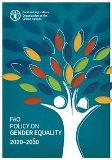Publications

FAO Policy on Gender Equality 2020–2030
17/12/2020
Gender equality is essential to achieve FAO’s mandate of a world free from hunger, malnutrition, and poverty. The revised Policy, which will be implemented over the next ten years, is a solid instrument to drive FAO’s efforts towards addressing the inequalities that are still pervasive in agriculture and food systems and to unleash the ambitions and potential of rural women and girls. 28 pp.

Gender transformative approaches for food security, improved nutrition and sustainable agriculture – A compendium of fifteen good practices
10/12/2020
The Compendium is a product of the Joint Programme on Gender Transformative Approaches for Food Security and Nutrition implemented by FAO, IFAD and WFP and funded by the European Union. The compendium includes the individual templates of the 15 good practices, provides a synthesis of the main features of the 15 GTAs presenting the core characteristics of 15 GTAs 166 pp.

Gender transformative approaches for food security, improved nutrition and sustainable agriculture - A compendium of fifteen good practices
10/12/2020
This flyer to the publication Gender transformative approaches for food security, improved nutrition and sustainable agriculture - A compendium of fifteen good practices provides a background to the Compendium and briefly summarizies the fifteen good practices. Gender transformative approaches (GTAs) are essential to the achievement of food security, improved nutrition and sustainable agricultural development. 4 pp.

GOOD PRACTICE Individual Household Mentoring
09/12/2020
Projects supported by the International Fund for Agricultural Development (IFAD) identify individual household mentoring as a project activity and provide funding to the Ministry of Local Government for implementation. They build on experiences on household mentoring gained in an earlier IFAD-supported District Livelihoods Support Programme. This document examines the purpose of the methodology and the domains of gender inequality that are addressed. 11 pp.

GOOD PRACTICE Gender Household Approach
09/12/2020
The purpose of the HRNS Gender Household Approach methodology is to promote farming as a family business. In implementing this methodology, the main objectives include joint decision making and planning in smallholder farming households, the active participation of women in training activities, and the inclusion of women in leadership positions in farmer organizations. This publication addresses key domains of gender inequality. 9 pp.

GOOD PRACTICE Nurturing Connections©
09/12/2020
Nurturing Connections© was developed and piloted by Helen Keller International (HKI) in 2012. It has been adapted for homestead food production and nutrition and tested in market development initiatives. This publication describes how the curriculum seeks to challenge and transform inequalities related to power relations, traditions and socio-cultural norms that can pose an obstacle to achieving better nutrition and production outcomes. 8 pp.

GOOD PRACTICE Gender Action Learning System
09/12/2020
This publication builds on the experience with Oxfam Novib, a total of 51 ongoing IFAD-supported projects across 26 countries that have some activities related to household methodologies (GALS being the most widely used and innovative household methodology), 37 of which are currently under implementation. 11 pp.

GOOD PRACTICE Gender Mainstreaming in Member-based Organizations
09/12/2020
Toolbox for Gender Mainstreaming in Member-based Organizations is the name of the methodology used to work toward individual empowerment of women and men, in parallel with an intentional change process of organizational structures towards gender equality. This paper outlines the different levels the methodology worked: the individual, enterprises/value chains and organizations while the household-level application is still under development. 10 pp.
